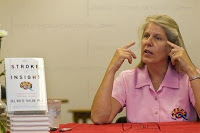Showing posts with label Jill Bolte Taylor. Show all posts
Showing posts with label Jill Bolte Taylor. Show all posts
Tuesday, October 15, 2013
Make the Most of the Present
Recently I realized how much time and energy I've expended thinking about the past or the future instead of being fully present in the moment that’s happening right now.
Sometimes I dwell on an interaction I had with another person. It could have happened a week, a year or even a decade ago. I replay who said what and re-experience the feelings associated with that exchange. While some of these are happy memories, more often the ones I revisit have regret, guilt or some other negative emotion attached to them.
Other times I imagine outcomes I don’t want to have happen in the future. This kind of thinking produces worry, anxiety and tension, and is not a productive use of my brain power.
These realizations came as I read Eckhart Tolle’s masterful book The Power of Now. His writing inspired me to reflect on situations I’ve lived through but didn’t fully experience because my mind was not in the here and now.
Tolle’s observations reminded me of the wisdom in another favorite book, My Stroke of Insight by Jill Bolte Taylor. These two authors offer similar advice for times when you find yourself distracted by memories or the unknown.
Their suggestions will bring your mind back to the present so you fully appreciate what’s going on before you in this moment.
1 – Focus on your breathing.
If you take a slow, deep breath and then let it out, you bring your mind to that one simple activity. Repeat inhaling and exhaling until you feel yourself relax into your body.
2 – Pay attention to sensory information.
What smells do you notice in the room right now? Use your eyes to take in the view that’s right in front of you. Next, close your eyes and identify the sounds you hear, both near and far. Identify any sensations you feel on your skin related to the temperature in the air, the clothing you’re wearing and any other objects touching your body, such as glasses or a watch.
3 – Give full attention when performing routines.
Whether you are cleaning up after a meal, walking up the stairs, or taking a shower, be totally present for these simple activities. Notice little aspects of each movement you make.
4 – Monitor your self-talk.
Get comfortable observing the words that run through your head as you think about what happened or what might occur. Avoid judging or criticizing what you notice. In fact, make a conscious decision that you will not subject yourself to internal verbal abuse.
As Tolle points out, when you practice these techniques, you’ll be able to measure your success by “the degree of peace that you feel within.”
“If you let yourself be absorbed completely, if you surrender completely to the moments as they pass, you live more richly those moments.” - Anne Morrow Lindbergh, American author (1906-2001)
"Wherever you are, be there." - Jim Rohn, American author (1930-2009)
"Breathe. Let go. And remind yourself that this very moment is the only one you know you have for sure." - Oprah Winfrey, American actress (1954- )
Monday, March 8, 2010
What a Stroke Victim Taught Me about Life
Sometimes a single experience, lasting but a few moments, can alter your perspective for the rest of your life.
While visiting my mother-in-law in her nursing home, my husband and I met two of her best friends, a couple married 63 years who share a room near hers. Mrs. Thompson had a stroke five years ago that has paralyzed almost every part of her body.
Except her eyes.
I was struck by the way she communicated with them. As I spoke with her and her husband, I could tell she understood everything we said. Just by the expressions she conveyed with her eyes.
Mr. Thompson has lived with his wife in the nursing home all five years so he could be by her side and tend to her needs. The love he expressed when speaking to or about his wife touched my heart, and her eyes shined brightly in response to his words.
I realized how much we miss in communication when we don’t watch a person’s eyes. Whether we’re talking or listening, the other person’s eyes reveal a lot to us if we’re paying attention. But we’re often so busy speaking about ourselves or waiting for our turn to talk that we don’t even notice these valuable cues.
As I was leaving their room, I took Mrs. Thompson’s hand in mine and held it closely for a few minutes. She smiled with her eyes and grasped my own hand tightly.
Later, I realized that I was able to pay attention to her eyes and instinctively reach for her hand because of wisdom I absorbed from Jill Bolte Taylor’s break-through book, My Stroke of Insight.
 Dr. Taylor is a brain scientist who experienced her own life-altering stroke at age 37. Her book describes her journey from the day of her stroke and the following ten years of her recovery. I was spell-bound reading about the thoughts and emotions she had during this process. Her book is an incredibly valuable resource if you know someone who’s had a stroke or brain injury. She explains what these individuals need most from others, even though they’re often unable to articulate those needs.
Dr. Taylor is a brain scientist who experienced her own life-altering stroke at age 37. Her book describes her journey from the day of her stroke and the following ten years of her recovery. I was spell-bound reading about the thoughts and emotions she had during this process. Her book is an incredibly valuable resource if you know someone who’s had a stroke or brain injury. She explains what these individuals need most from others, even though they’re often unable to articulate those needs.
Starting today, pay more attention to what’s being communicated through a person’s eyes. Use your eyes to reinforce your own words, and watch the eyes of others when they’re speaking in order to perceive the total message. If you do this, you’ll connect on a deeper level with your customers, coworkers, friends, and family members. And your relationships will grow stronger as a result.
While visiting my mother-in-law in her nursing home, my husband and I met two of her best friends, a couple married 63 years who share a room near hers. Mrs. Thompson had a stroke five years ago that has paralyzed almost every part of her body.
Except her eyes.
I was struck by the way she communicated with them. As I spoke with her and her husband, I could tell she understood everything we said. Just by the expressions she conveyed with her eyes.
Mr. Thompson has lived with his wife in the nursing home all five years so he could be by her side and tend to her needs. The love he expressed when speaking to or about his wife touched my heart, and her eyes shined brightly in response to his words.
I realized how much we miss in communication when we don’t watch a person’s eyes. Whether we’re talking or listening, the other person’s eyes reveal a lot to us if we’re paying attention. But we’re often so busy speaking about ourselves or waiting for our turn to talk that we don’t even notice these valuable cues.
As I was leaving their room, I took Mrs. Thompson’s hand in mine and held it closely for a few minutes. She smiled with her eyes and grasped my own hand tightly.
Later, I realized that I was able to pay attention to her eyes and instinctively reach for her hand because of wisdom I absorbed from Jill Bolte Taylor’s break-through book, My Stroke of Insight.
 Dr. Taylor is a brain scientist who experienced her own life-altering stroke at age 37. Her book describes her journey from the day of her stroke and the following ten years of her recovery. I was spell-bound reading about the thoughts and emotions she had during this process. Her book is an incredibly valuable resource if you know someone who’s had a stroke or brain injury. She explains what these individuals need most from others, even though they’re often unable to articulate those needs.
Dr. Taylor is a brain scientist who experienced her own life-altering stroke at age 37. Her book describes her journey from the day of her stroke and the following ten years of her recovery. I was spell-bound reading about the thoughts and emotions she had during this process. Her book is an incredibly valuable resource if you know someone who’s had a stroke or brain injury. She explains what these individuals need most from others, even though they’re often unable to articulate those needs.Starting today, pay more attention to what’s being communicated through a person’s eyes. Use your eyes to reinforce your own words, and watch the eyes of others when they’re speaking in order to perceive the total message. If you do this, you’ll connect on a deeper level with your customers, coworkers, friends, and family members. And your relationships will grow stronger as a result.
Subscribe to: Posts (Atom)






